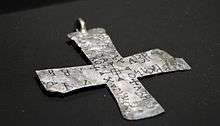Abracadabra
Abracadabra is an incantation used as a magic word in stage magic tricks, and historically was believed to have healing powers when inscribed on an amulet.

Etymology
Abracadabra is of unknown origin, and its first occurrence is in the second century works of Serenus Sammonicus, according to the Oxford English Dictionary.[1] Several folk etymologies are associated with the word:[2] from phrases in Hebrew that mean "I will create as I speak",[3] or Aramaic "I create like the word" (אברא כדברא),[4] to folk etymologies that point to similar words in Latin and Greek such as abraxas.[5] According to the OED Online, "no documentation has been found to support any of the various conjectures."[5]
History
.jpg)
The first known mention of the word was in the second century AD in a book called Liber Medicinalis (sometimes known as De Medicina Praecepta Saluberrima) by Serenus Sammonicus,[6] physician to the Roman emperor Caracalla, who in chapter 51 prescribed that malaria sufferers wear an amulet containing the word written in the form of a triangle.[7][8]
The power of the amulet, he claimed, makes lethal diseases go away. Other Roman emperors, including Geta and Severus Alexander, were followers of the medical teachings of Serenus Sammonicus and may have used the incantation as well.[6]
It was used as a magical formula by the Gnostics of the sect of Basilides in invoking the aid of beneficent spirits against disease and misfortune.[9] It is found on Abraxas stones, which were worn as amulets. Subsequently, its use spread beyond the Gnostics.
The Puritan minister Increase Mather dismissed the word as bereft of power. Daniel Defoe also wrote dismissively about Londoners who posted the word on their doorways to ward off sickness during the Great Plague of London.[10]
The word is now commonly used as an incantation in the performance of magic.
See also
- Abrahadabra
- Barbarous name
- Hocus pocus (magic)
- Open Sesame (phrase)
- Sator Square
References
- "abracadabra", Oxford English Dictionary, Oxford University Press, 2009
- Elyse Graham (December 30, 2016), "Magic words: performative utterance in fact and fantasy", Oxford Dictionaries, Oxford University Press
- Kushner, Lawrence (1998). The Book of Words: Talking Spiritual Life, Living Spiritual Talk. Jewish Lights Publishing. p. 11. ISBN 1580230202.
- Lew, Alan. "This is Real and You Are Completely Unprepared". Little, Brown and Company. Retrieved 16 March 2015.
- "abracadabra", Oxford English Dictionary Online, retrieved September 1, 2017
- Sammonicus, Quintus Serenus (1786). Quinti Sereni Samonici De medicina praecepta salvberrima. In bibliopolio I.G. Mülleriano. p. 4.
- Shah, Sonia (10 July 2010). "The Tenacious Buzz of Malaria". Wall Street Journal. Retrieved 17 June 2018.
- Bartleby Archived November 22, 2008, at the Wayback Machine
- Chisholm, Hugh, ed. (1911). . Encyclopædia Britannica (11th ed.). Cambridge University Press.
- Daniel Defoe. A Journal of the Plague Year. London, Dent, 1911 (1722)
External links
| Look up abracadabra in Wiktionary, the free dictionary. |
- Abracadabra Robert Todd Carroll, Skeptic's Dictionary

- . The American Cyclopædia. 1879.
- . Collier's New Encyclopedia. 1921.
- . Encyclopædia Britannica. 1 (9th ed.). 1878.